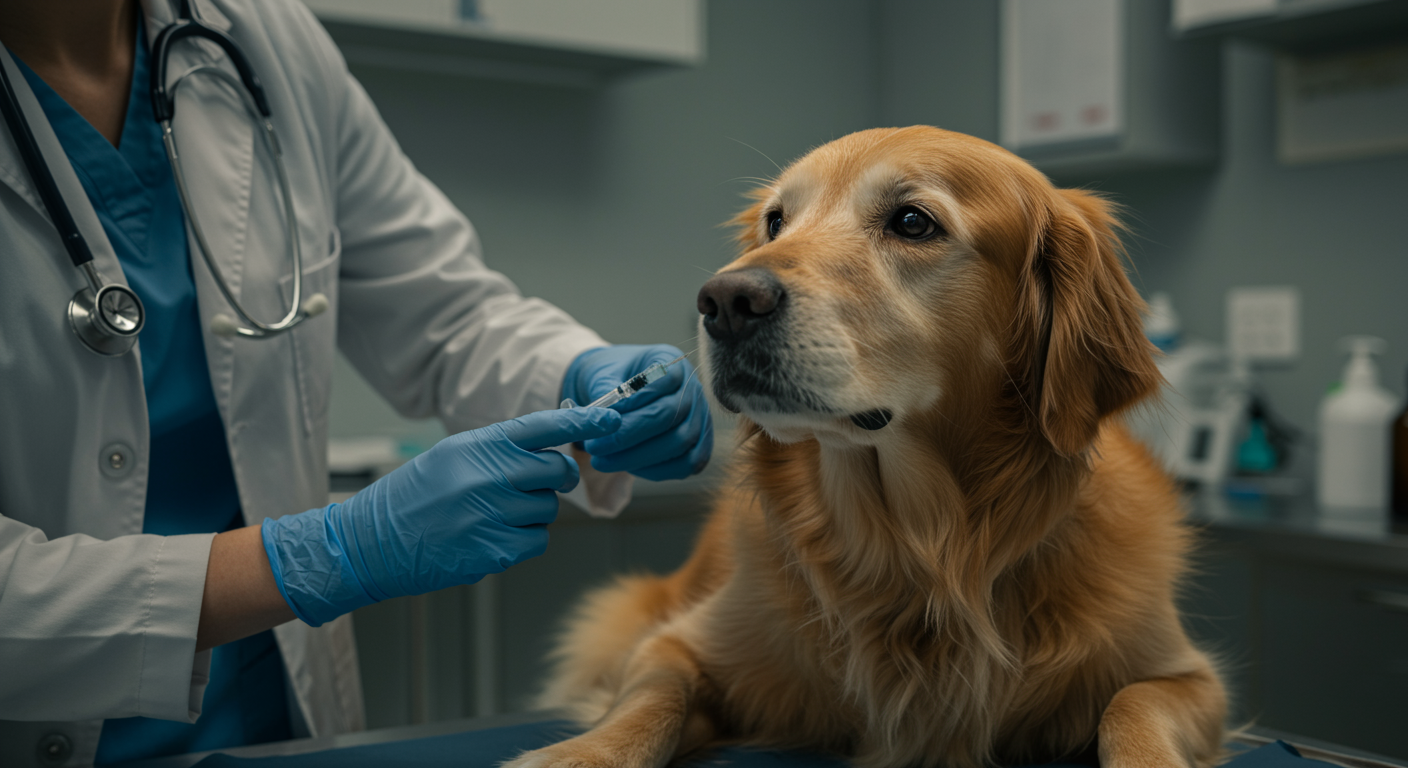Vaccination and parasite prevention protocols require significant modifications as Golden Retrievers enter their senior years, balancing the need for continued protection against infectious diseases with considerations for aging immune systems, potential medication interactions, and individual health status. The “one-size-fits-all” approach to preventive care that may work for younger dogs becomes inadequate for senior Golden Retrievers, who face unique challenges including immunosenescence, increased susceptibility to adverse reactions, and complex health conditions that influence vaccination decisions. Understanding how to adapt preventive care protocols ensures optimal protection while minimizing risks associated with over-vaccination or inappropriate parasite prevention strategies.
Senior Golden Retrievers experience natural changes in immune function that affect both their ability to mount protective immune responses to vaccines and their susceptibility to infectious diseases and parasitic infections. These changes, combined with the increased likelihood of chronic health conditions and medication use, create a complex decision-making environment where individualized approaches become essential. The goal shifts from routine protocol application to strategic, risk-based preventive care that considers each dog’s specific circumstances, lifestyle, and health status.
The evolution of veterinary medicine has brought sophisticated tools for assessing immunity, determining vaccination needs, and selecting appropriate parasite prevention protocols for senior dogs. Antibody titer testing, risk assessment frameworks, and understanding of vaccine immunology allow for more precise, individualized approaches that maintain protection while avoiding unnecessary interventions. Success in senior preventive care lies in working closely with veterinary professionals to develop customized protocols that evolve with changing health needs and circumstances.
Understanding Immune System Changes in Senior Dogs
Immunosenescence and Its Implications
Aging naturally affects immune system function through a process called immunosenescence, which has profound implications for vaccination efficacy and disease susceptibility in senior Golden Retrievers.
Decreased Antibody Production: Senior dogs often produce fewer antibodies in response to vaccination, potentially requiring modified vaccination schedules or additional boosters to maintain protective immunity levels.
Reduced Cell-Mediated Immunity: The cellular immune response, crucial for fighting intracellular pathogens and tumor cells, becomes less efficient with age, affecting both disease resistance and vaccine responses.
Chronic Low-Grade Inflammation: Many senior dogs develop chronic inflammatory states that can interfere with normal immune responses while increasing susceptibility to certain diseases.
Memory Cell Dysfunction: Immunological memory, the basis of long-lasting vaccine protection, may become less reliable in senior dogs, potentially shortening the duration of vaccine-induced immunity.
Factors Affecting Senior Immune Function
Underlying Health Conditions: Chronic diseases common in senior Golden Retrievers, such as cancer, diabetes, or kidney disease, can significantly compromise immune function and influence vaccination strategies.
Medication Effects: Many medications used for age-related conditions can suppress immune function, affecting both vaccine responses and disease susceptibility.
Nutritional Status: Poor nutrition, common in dogs with chronic diseases or decreased appetite, can impair immune function and vaccine efficacy.
Stress and Environmental Factors: Chronic stress, whether from pain, illness, or environmental changes, can suppress immune responses and increase disease susceptibility.
| Immune System Component | Age-Related Changes | Vaccination Impact | Disease Susceptibility |
|---|---|---|---|
| Antibody Production | Decreased quantity and quality | Reduced vaccine efficacy | Increased bacterial infections |
| T-Cell Function | Impaired cellular responses | Poor vaccine memory | Viral and fungal infections |
| Inflammatory Response | Chronic inflammation | Altered vaccine reactions | Autoimmune conditions |
| Memory Cells | Reduced longevity | Shortened immunity duration | Reactivation of latent infections |
Core Vaccination Considerations for Seniors
Risk-Benefit Analysis Framework
Vaccination decisions for senior Golden Retrievers require careful consideration of individual risk factors, potential benefits, and possible adverse effects.
Disease Risk Assessment: Evaluating the actual risk of exposure to specific diseases based on lifestyle, geographic location, and local disease prevalence helps determine which vaccines are truly necessary.
Vaccine Efficacy in Seniors: Understanding that vaccine responses may be reduced in senior dogs helps set realistic expectations and guides decisions about booster frequency and timing.
Adverse Reaction Risk: Senior dogs may be at increased risk for vaccine reactions due to immune system changes, concurrent medications, or underlying health conditions.
Duration of Immunity: Determining how long vaccine-induced immunity lasts in individual senior dogs helps optimize booster intervals while avoiding over-vaccination.
Modified Vaccination Protocols
Titer Testing Integration: Antibody titer testing can help determine whether individual dogs maintain protective immunity, potentially extending intervals between boosters or eliminating unnecessary vaccinations.
Individualized Schedules: Moving away from annual vaccination protocols to individualized schedules based on titer results, risk assessment, and health status provides more appropriate care for senior dogs.
Single Antigen Vaccines: Using single antigen vaccines instead of combination products may reduce the immune system burden and allow for more precise targeting of necessary protection.
Timing Considerations: Scheduling vaccinations during periods of optimal health and avoiding vaccination during illness or stress helps maximize efficacy while minimizing adverse effects.
Core Vaccine Modifications
Rabies Vaccination: Legally required in most areas, but some jurisdictions allow extended intervals or exemptions for dogs with documented health conditions that contraindicate vaccination.
DHPP (Distemper, Hepatitis, Parvovirus, Parainfluenza): These core vaccines may be administered less frequently in senior dogs with demonstrated immunity through titer testing.
Bordetella: Kennel cough vaccination may be more important for senior dogs due to increased susceptibility to respiratory infections, but frequency can be adjusted based on exposure risk.
| Vaccine | Traditional Schedule | Senior Modifications | Titer Testing Value | Risk Considerations |
|---|---|---|---|---|
| Rabies | Annual or triennial | Legal requirements vary | Limited value | Required by law |
| Distemper | Annual | Every 3+ years with titers | High value | Low disease risk |
| Parvovirus | Annual | Every 3+ years with titers | High value | Moderate disease risk |
| Hepatitis | Annual | Every 3+ years with titers | Moderate value | Low disease risk |
| Bordetella | Annual | Based on exposure risk | Limited value | High in social settings |
Non-Core Vaccination Decisions
Lifestyle-Based Vaccine Selection
Lyme Disease: Important for dogs in endemic areas with tick exposure, but may be unnecessary for dogs with limited outdoor access or in non-endemic regions.
Leptospirosis: Critical for dogs with exposure to wildlife, standing water, or rural environments, but may pose higher reaction risks in senior dogs.
Canine Influenza: Recommended for dogs with high social exposure (boarding, daycare, dog parks) but unnecessary for dogs with limited social contact.
Rattlesnake Vaccine: Valuable for dogs in areas with high rattlesnake populations but requires careful risk-benefit analysis for senior dogs with health conditions.
Geographic and Seasonal Considerations
Regional Disease Patterns: Understanding local disease prevalence helps determine which non-core vaccines provide genuine benefit versus unnecessary immune system stimulation.
Seasonal Exposure Risks: Some diseases show seasonal patterns that can guide vaccination timing and necessity for individual senior dogs.
Travel Considerations: Dogs that travel to different regions may need additional protection, but this must be balanced against the risks of multiple vaccinations in senior dogs.
Climate Change Effects: Changing disease distributions due to climate change may affect vaccination recommendations for senior dogs in previously low-risk areas.
Parasite Prevention in Senior Golden Retrievers
Age-Related Susceptibility Changes
Decreased Immune Surveillance: Reduced immune function in senior dogs can increase susceptibility to parasitic infections and reduce the effectiveness of natural parasite resistance.
Medication Interactions: Many parasite prevention products can interact with medications commonly used in senior dogs, requiring careful product selection and monitoring.
Organ Function Considerations: Decreased liver or kidney function in senior dogs may affect the metabolism and elimination of parasite prevention medications, potentially increasing toxicity risks.
Chronic Disease Impacts: Underlying health conditions can make senior dogs more susceptible to parasite-related complications while also affecting treatment options.
Heartworm Prevention Strategies
Continued Importance: Heartworm prevention remains crucial for senior dogs, as heartworm disease is more dangerous and difficult to treat in older animals.
Product Selection: Choosing heartworm preventives with minimal drug interactions and appropriate safety profiles for senior dogs becomes increasingly important.
Monitoring Requirements: Senior dogs on heartworm prevention may require more frequent monitoring for adverse effects and drug interactions.
Testing Protocols: Annual heartworm testing remains important, but the frequency and type of testing may be modified based on individual health status and medication interactions.
| Parasite Prevention | Senior Considerations | Monitoring Needs | Interaction Risks |
|---|---|---|---|
| Heartworm | Continued necessity, careful product selection | Annual testing, reaction monitoring | Moderate with cardiac medications |
| Fleas/Ticks | Increased importance due to disease risk | Skin reaction monitoring | Low to moderate |
| Intestinal Parasites | Regular screening important | Fecal examinations | Low |
| External Parasites | Enhanced surveillance needed | Visual inspections | Variable by product |
Flea and Tick Prevention
Enhanced Importance: Senior dogs may be more susceptible to flea-related anemia and tick-borne diseases, making consistent prevention increasingly important.
Product Tolerance: Some senior dogs may develop sensitivities to flea and tick products they previously tolerated, requiring product changes or modified application protocols.
Environmental Management: Combining topical treatments with environmental control becomes more important for senior dogs who spend more time resting in areas where parasites might accumulate.
Seasonal Adjustments: Modifying prevention protocols based on seasonal parasite activity can help minimize unnecessary chemical exposure while maintaining protection during high-risk periods.
Intestinal Parasite Management
Regular Screening: Senior dogs should receive regular fecal examinations to detect intestinal parasites that might cause more severe problems in aging animals.
Deworming Protocols: Routine deworming may be modified based on lifestyle, exposure risk, and individual health status rather than following blanket protocols.
Nutritional Impacts: Intestinal parasites can have more significant nutritional impacts on senior dogs with already compromised appetites or absorption issues.
Medication Selection: Choosing deworming medications with appropriate safety profiles for senior dogs and minimal interactions with other medications becomes crucial.
Titer Testing and Immunity Assessment
Understanding Antibody Titers
Protective Levels: Established protective antibody levels exist for some diseases, allowing for objective assessment of immunity status without relying on vaccination history alone.
Limitations: Titer testing doesn’t assess all aspects of immunity and may not predict protection duration, requiring interpretation within the context of individual risk factors.
Cost-Benefit Analysis: While titer testing involves additional costs, it can prevent unnecessary vaccinations and associated risks in senior dogs with adequate immunity.
Timing Considerations: Optimal timing for titer testing depends on previous vaccination history, health status, and individual risk factors.
Implementing Titer-Based Protocols
Baseline Establishment: Initial titer testing helps establish individual immunity status and guides future vaccination decisions.
Monitoring Intervals: Regular titer monitoring allows for proactive vaccination when immunity wanes while avoiding unnecessary boosters when protection remains adequate.
Decision Trees: Developing clear decision trees for interpreting titer results helps ensure consistent, appropriate vaccination decisions for senior dogs.
Record Keeping: Maintaining detailed records of titer results, vaccination dates, and health status supports long-term management of senior vaccination protocols.
| Disease | Protective Titer Level | Testing Frequency | Booster Indication |
|---|---|---|---|
| Distemper | ≥1:32 | Every 1-3 years | When titers drop below protective levels |
| Parvovirus | ≥1:80 | Every 1-3 years | When titers drop below protective levels |
| Hepatitis | ≥1:32 | Every 1-3 years | When titers drop below protective levels |
| Rabies | Variable by jurisdiction | As required by law | Legal requirements supersede titers |
Health Status Considerations
Chronic Disease Management
Cancer Patients: Dogs receiving chemotherapy or radiation therapy require modified vaccination protocols due to immunosuppression, with timing carefully coordinated with treatment schedules.
Kidney Disease: Dogs with kidney disease may require modified parasite prevention protocols and careful monitoring of medication metabolism and elimination.
Heart Disease: Cardiac medications can interact with some parasite prevention products, requiring careful product selection and monitoring.
Diabetes: Diabetic dogs may have altered immune responses and require modified vaccination schedules and enhanced parasite prevention due to increased infection susceptibility.
Medication Interactions
Immunosuppressive Drugs: Dogs receiving steroids or other immunosuppressive medications may have reduced vaccine efficacy and require modified protocols.
Chemotherapy Agents: Cancer treatment drugs can significantly impact immune function and require careful coordination of vaccination and parasite prevention.
Cardiac Medications: Some heart medications can interact with parasite prevention products, requiring alternative product selection or modified dosing.
Pain Medications: NSAIDs and other pain medications may affect immune responses and require consideration in vaccination timing decisions.
Pre-Vaccination Health Assessment
Physical Examination: Thorough health assessment before vaccination helps identify conditions that might contraindicate vaccination or increase reaction risks.
Laboratory Screening: Blood work may be indicated before vaccination in senior dogs to assess organ function and overall health status.
Stress Minimization: Reducing stress during vaccination visits helps optimize immune responses and minimize adverse reactions in senior dogs.
Recovery Monitoring: Enhanced monitoring after vaccination helps detect adverse reactions early and provides data for future vaccination decisions.
| Health Condition | Vaccination Modifications | Parasite Prevention Changes | Monitoring Requirements |
|---|---|---|---|
| Cancer | Coordinate with treatment schedule | Enhanced prevention due to immunosuppression | Frequent health assessments |
| Kidney Disease | Consider reduced vaccine frequency | Monitor drug metabolism | Regular kidney function tests |
| Heart Disease | Minimize stress, monitor reactions | Check drug interactions | Cardiac monitoring |
| Diabetes | Enhanced infection monitoring | Standard protocols with monitoring | Blood glucose stability |
Adverse Reaction Management
Recognition and Response
Immediate Reactions: Anaphylaxis and other immediate reactions require emergency intervention and may contraindicate future vaccination with specific antigens.
Delayed Reactions: Reactions occurring hours to days after vaccination may be subtle but can indicate immune-mediated responses requiring future protocol modifications.
Injection Site Reactions: Local reactions at injection sites may be more common or severe in senior dogs and can guide decisions about future vaccination routes or products.
Systemic Reactions: General malaise, appetite loss, or behavioral changes following vaccination may indicate adverse reactions requiring documentation and consideration in future protocols.
Prevention Strategies
Pre-medication: Antihistamines or other pre-medications may be beneficial for senior dogs with previous mild vaccine reactions.
Product Selection: Choosing vaccines with fewer additives or different adjuvants may reduce reaction risks in sensitive senior dogs.
Timing Modifications: Spacing out multiple vaccines or administering them during optimal health periods can reduce reaction risks.
Alternative Routes: Intranasal vaccines may be better tolerated than injectable vaccines for some senior dogs and specific diseases.
Documentation and Follow-up
Reaction Records: Detailed documentation of any adverse reactions helps guide future vaccination decisions and provides valuable information for veterinary decision-making.
Recovery Monitoring: Following up after vaccination helps assess tolerance and provides data for modifying future protocols.
Communication: Clear communication with all veterinary team members ensures consistent approaches to senior dogs with reaction histories.
Emergency Planning: Having clear protocols for managing severe reactions helps ensure appropriate response if adverse events occur.
Developing Individualized Protocols
Assessment Factors
Lifestyle Analysis: Indoor versus outdoor lifestyle, social exposure, travel patterns, and geographic location all influence disease risk and appropriate prevention strategies.
Health Status Evaluation: Current health conditions, medications, and overall physical condition guide vaccination and parasite prevention decisions.
Risk Tolerance: Owner preferences and tolerance for disease risk versus intervention risk must be considered in protocol development.
Economic Factors: Cost considerations for titer testing, specialized vaccines, and monitoring must be balanced against potential benefits.
Protocol Development Process
Initial Assessment: Comprehensive evaluation of health status, lifestyle, and risk factors provides the foundation for individualized protocol development.
Goal Setting: Clear goals for disease prevention, quality of life maintenance, and risk minimization guide protocol decisions.
Monitoring Plans: Establishing protocols for ongoing assessment and protocol adjustment ensures continued appropriateness of preventive care strategies.
Communication Strategies: Clear communication with owners about protocol rationale, expectations, and monitoring requirements supports successful implementation.
| Protocol Component | Individualization Factors | Monitoring Indicators | Adjustment Triggers |
|---|---|---|---|
| Vaccination Schedule | Health status, titer results, lifestyle | Antibody levels, reaction history | Declining titers, health changes |
| Parasite Prevention | Exposure risk, medication interactions | Product tolerance, efficacy | Adverse reactions, resistance |
| Health Monitoring | Chronic diseases, age-related changes | Clinical parameters, quality of life | Condition progression, new diagnoses |
| Emergency Protocols | Reaction history, health status | Response to interventions | Severe reactions, protocol failures |
Long-Term Management and Adaptation
Protocol Evolution
Age-Related Adjustments: As dogs continue aging, protocols may need further modification to accommodate changing health status and capabilities.
Health Status Changes: New diagnoses or condition progression may require protocol revisions to maintain appropriate disease prevention while managing health risks.
Lifestyle Modifications: Changes in activity levels, social exposure, or living situations may affect disease risks and appropriate prevention strategies.
Emerging Diseases: New disease threats or changing epidemiological patterns may require protocol updates to maintain appropriate protection.
Quality of Life Integration
Comfort Prioritization: Ensuring that preventive care protocols support rather than compromise quality of life becomes increasingly important for senior dogs.
Stress Minimization: Reducing stress associated with preventive care helps maintain the benefits of disease prevention while supporting overall well-being.
Family Integration: Protocols must be practical for families to implement consistently while providing appropriate protection for aging dogs.
End-of-Life Considerations: As dogs approach end-of-life stages, preventive care goals may shift toward comfort maintenance rather than disease prevention.
Protecting Health Through Thoughtful Prevention
Vaccination and parasite prevention for senior Golden Retrievers represents a delicate balance between maintaining protection against infectious diseases and parasites while respecting the changing needs and capabilities of aging bodies. The shift from routine protocols to individualized approaches reflects a deeper understanding of senior dog physiology and the recognition that one size no longer fits all when it comes to preventive care.
Success in senior preventive care lies not in following rigid schedules but in developing thoughtful, evidence-based approaches that consider each dog’s unique circumstances, health status, and risk factors. This individualized approach often provides better protection with fewer risks, supporting both physical health and quality of life throughout the golden years.
The investment in appropriate preventive care for senior Golden Retrievers pays dividends in maintained health, reduced disease risk, and continued quality of life. By working closely with veterinary professionals to develop customized protocols, owners ensure that their beloved companions receive the protection they need while avoiding unnecessary interventions that could compromise their well-being.
Your commitment to providing thoughtful, individualized preventive care for your senior Golden Retriever demonstrates the depth of your understanding of their changing needs and your dedication to their continued health and happiness. Through careful assessment, strategic planning, and ongoing monitoring, you ensure that preventive care supports rather than burdens your aging companion, allowing them to enjoy their golden years with the protection they need and the comfort they deserve.




